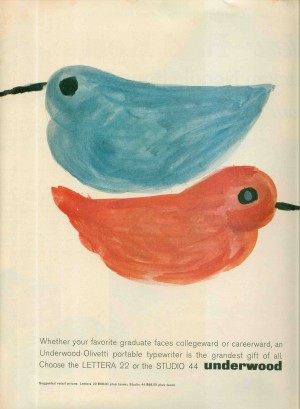1960s
Phyliss Diller
Recently some readers objected to my characterization of 1960's-era Phyllis Diller as "unfunny."Decide for yourselves.
She doesn't appear in the Liberace clip until the 3-minute mark.
Posted By: Paul - Sun Nov 02, 2008 -
Comments (3)
Category: 1960s, Comedians
The Mothra Song
I think we all need a little more Mothra in our lives. I myself intend to sing this song in times of personal crisis.
Posted By: Paul - Sat Nov 01, 2008 -
Comments (6)
Category: Gods, Movies, Music, Foreign Customs, 1960s, Fictional Monsters
Cheerios and V-8
I love Cheerios, and can tolerate V-8. But there's no way I could imagine eating a spoonful of Cheerios and then swallowing a gulp of V-8 immediately after the sweet milky mouthful.
Posted By: Paul - Thu Oct 30, 2008 -
Comments (16)
Category: Business, Advertising, Food, Toys, Children, Space Travel, 1960s
Follies of the Mad Men #40
[From Life magazine for May 18 1962.]There's nothing oddball about this ad--except its incredible lameness! Look at those stupid birds that dominate three-quarters of the page. What do they tell the reader about the product? Absolutely nothing! This full-page ad could have run as a tiny spot with the same text at the back of the magazine for a fraction of the cost. And it would have achieved the same results.
Imagine the malicious glee at the ad agency that created this: "We just grossed a hundred K for two blotches of paint!"
Posted By: Paul - Mon Oct 27, 2008 -
Comments (12)
Category: Animals, Business, Advertising, 1960s
Girls Together Outrageously
A rock band composed entirely of famous groupies? Such were the GTO's, an acronym for Girls Together Outrageously, and brainchild of Frank Zappa. Unlike, say, the Pussycat Dolls, at least they were honest about their pasts.Here's their song "The Ghost Chained To The Past, Present and Future (Shock Treatment)," delivered over a series of stills.
Posted By: Paul - Thu Oct 16, 2008 -
Comments (5)
Category: Music, Sex Symbols, 1960s, Women
Follies of the Mad Men #33
I insist on having my next new car delivered by magical flaming meteor!
Posted By: Paul - Sat Oct 04, 2008 -
Comments (3)
Category: Business, Advertising, Fashion, Music, 1960s, Cars
Color It Clean
So long as we've started a toilet thread, let's all watch "Color It Clean," so that we appreciate the men and women who maintain our public lavatories.This film reminds me of Barney Gumble's autobiographical entry in the Springfield Film Festival. I could find the clip only in Italian, but that adds a certain frisson to the viewing experience, I think.
Posted By: Paul - Fri Oct 03, 2008 -
Comments (3)
Category: Bathrooms, Buildings and Other Structures, Bums, Hobos, Tramps, Beggars, Panhandlers and Other Streetpeople, Hygiene, Body Fluids, Excrement, Inebriation and Intoxicants, Television, Documentaries, 1960s
Preparation of Foods
If our readers plan on cooking animal testicles, they'll need to know all about the history of food prep, including that new discovery--microwaves!
Posted By: Paul - Thu Oct 02, 2008 -
Comments (0)
Category: Food, Documentaries, 1960s, Yesterday’s Tomorrows
The 10th Victim
This article in today's NEW YORK TIMES tells us about "Street Wars," a game played in urban environments by players determined to "kill" each other. Several precedents for this game are cited in the article, but the writer misses the most important and primal one: A 1953 story by famed and beloved SF writer Robert Sheckley, titled "The Seventh Victim."The story was later filmed as THE 10TH VICTIM. Its most famous scene: Ursula Andress using guns concealed in her bra, as seen in the second clip below.
Posted By: Paul - Sat Sep 27, 2008 -
Comments (2)
Category: Explosives, Games, Roleplayers and Re-enactors, Geeks, Nerds and Pointdexters, Guns, Literature, Science Fiction, Movies, Sexuality, Sex Symbols, War, Weapons, 1950s, 1960s, Women, Yesterday’s Tomorrows
Master Jack
For no discernible reason, I had this song running through my head yesterday. I'm thinking of polling Alex and Chuck to see if we can make it the official theme song of WEIRD UNIVERSE.Read about 4 Jacks and a Jill here.
Posted By: Paul - Mon Sep 15, 2008 -
Comments (2)
Category: Music, Weird Universe, Hair Styling, 1960s

| Who We Are |
|---|
| Alex Boese Alex is the creator and curator of the Museum of Hoaxes. He's also the author of various weird, non-fiction, science-themed books such as Elephants on Acid and Psychedelic Apes. Paul Di Filippo Paul has been paid to put weird ideas into fictional form for over thirty years, in his career as a noted science fiction writer. He has recently begun blogging on many curious topics with three fellow writers at The Inferior 4+1. Contact Us |





